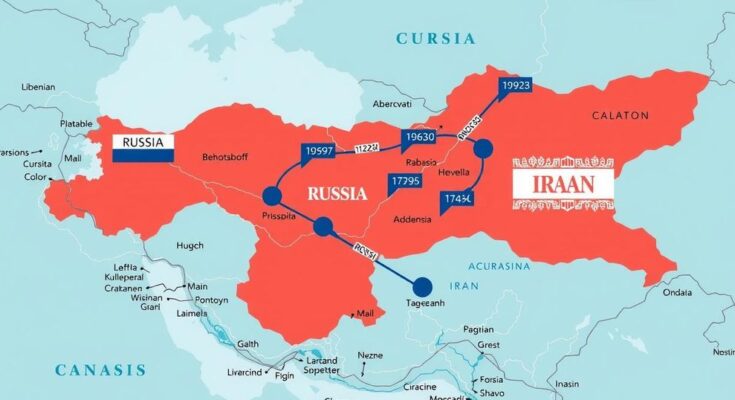On January 17, 2024, Russia and Iran signed the Treaty on Comprehensive Strategic Partnership, aimed at strengthening bilateral relations. However, they face significant divergences in their interests in the South Caucasus regarding energy, transport projects, and military relations. Key areas of disagreement include the Zangezur Corridor, the Aras Corridor, and the competitive energy dynamics affecting Armenia, suggesting that their relationship may remain unaligned unless conflicts are effectively addressed.
On January 17, 2024, Russian President Vladimir Putin and Iranian President Masoud Pezeshkian signed the Treaty on Comprehensive Strategic Partnership to enhance bilateral relations, particularly in opposition to NATO expansion and the development of the North-South Corridor. However, despite their collaborative efforts, notably in constructing the Rasht-Astara railway, both nations are increasingly at odds within the South Caucasus, especially regarding energy and transportation networks.
Tensions manifest in different attitudes toward the recognition of Abkhazia and South Ossetia’s independence from Georgia and the military links between Israel and Azerbaijan. Additionally, they diverge in economic interests involving Armenia, Azerbaijan, and Georgia, particularly related to energy exports and transportation routes. This discord highlights the complex dynamics at play as the two nations navigate their interests in the region’s geopolitics.
The disagreement over the Zangezur Corridor, which Azerbaijan aims to establish between its territory and Nakhchivan, illustrates this rift. Following a visit by President Putin to Baku, Russia indicated support for Azerbaijan’s unrestricted access to Nakhchivan, a decision that incited criticism from Iran. Iran perceives this corridor as detrimental to its borders and regional stability, further complicating the relationship between the two nations.
Moreover, conflicts arise over the proposed Aras Corridor between Azerbaijan and Nakhchivan. While Azerbaijan and Iran have previously agreed to develop transport links, Russia has not prioritized such projects, favoring routes that bolster its influence. This disparity underscores the ongoing friction, as Iran seeks to establish alternative routes while Russia aims to retain its hold over transport connections through Armenia.
Moscow and Tehran also compete over the railway to be constructed between Armenia and Iran, a project that threatens Russian monopolies within the region’s transport sector. The 2009 agreement between Armenia and Iran for a railway construction reflects this competition, as Russia perceives a potential reduction in its influence over Armenia if the project gains traction.
In terms of natural gas exports to Armenia, Tehran and Yerevan’s long-term agreement has been complicated by Gazprom’s increasing control over the region’s gas supply routes. Iran’s aspirations to expand its gas exports have been stymied by pressures that favor Russian interests, further showcasing the entrenched competition between the two nations in the South Caucasus.
Ultimately, while Russia and Iran maintain a veneer of partnership, their conflicting objectives in the South Caucasus hinder their collaboration. The lack of a unified strategic approach, especially in critical areas such as energy and transport, could lead to further discord unless both countries reconcile these differences effectively.
The complex interplay of cooperation and conflict between Russia and Iran in the South Caucasus highlights diverging interests that challenge their strategic partnership. Their differences regarding transportation corridors, energy exports, and regional influence emphasize the necessity for both parties to address unresolved conflicts to foster a more aligned approach in navigating the geopolitical landscape. Without a concerted effort to mitigate these disparities, their relationship in the South Caucasus is likely to remain fragmented.
Original Source: jamestown.org




